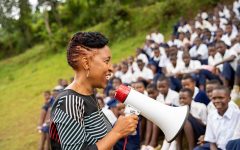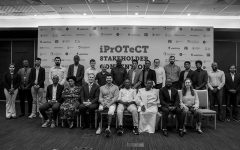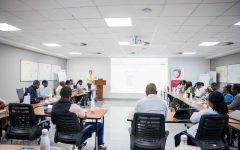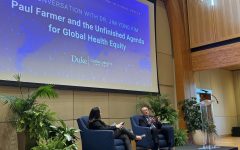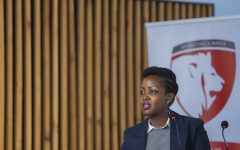Passion for Programming: IT Assistant Liliane Uwase on Striving for Equity
March 26, 2021 2021-03-26 11:04Passion for Programming: IT Assistant Liliane Uwase on Striving for Equity

Joining the UGHE Family in February this year, Liliane Uwase was immediately at the forefront of UGHE’s seamless transition to online working and learning. Serving as an IT Helpdesk Assistant, her team’s work has been critical in meeting COVID-19 related demands for new virtual innovations in teaching, as well as keeping the wider UGHE community connected whilst working from home. Faced with the cancellation of in-person events, training, and conferences, her team have also spearheaded the technical support for UGHE’s ever-growing webinar series, uniting leaders, learners, change-makers, social activists, and implementers from diverse settings globally to share learnings and offer actionable strategies to address global health threats like COVID.
Here, she shares where and who her passion for programming stemmed from, and how she plans to use this as a powerful tool in her personal and professional equity mission at UGHE.
***

Most of my high-school experience was very pre-defined and structured. Standardized final examinations determined not only what we learned but also how we would learn it. Policy-makers decided; teachers executed. Many students complied; some students did not. Others could not. Test by test, the students’ curiosity was killed. In my senior year of high school, I had a computer science teacher called Niyitegeka. He always told me that I had enormous potential in programming. I remember when he gave us our final exam results, he’d written on my test paper, “You, Liliane, are a programmer.” Before this, I’d been confused about the future, and yet this is what I needed; for someone to seek me out and give me the encouragement that; “You can do this. You already are”. Without his encouragement, I would not be the IT geek I am today.
Yet I always wonder what happened to the students who never met a teacher like Niyitegeka? Especially ladies pursuing careers in what the world tends to see as the “boys’ fields” and led in a linear path to doing careers that suited their gender. With such educational boundaries, how are students supposed to develop skills and understanding around critical areas such as equity, equality, creativity, problem-solving skills, critical thinking, and technology? One-track approaches to education mean we’ll never be able to solve the problems our societies are facing, especially the technological challenges facing education in Africa. My sole mission is to assist in developing education in Africa where there is great potential to develop science and technology. I believe in Nelson Mandela’s view in education as ‘a powerful weapon to change the world.’ I want to be the “Niyitegeka teacher” to the youth and to motivate parents to educate their girls to fight for their rights in the future.
When you look at the ratio of boys to girls, and men to women in certain fields such as law, civil engineering, computer programmers, health leaders, architects, surgeons, and doctors, and also at the lack of equal pay across all sectors, I often wonder; what do we need to do to put equity in action?

Equity is such a powerful concept but sometimes it is viewed lightly; we see it as a concept that simply means equal pay and equal opportunities. But it needs to go beyond this – through equity-driven education that transcends the social boundaries that have been defined for us. We know that men and boys are encouraged from a very young age that they can do anything, yet women and girls do not share in this same encouragement. For equity to really take shape, there needs to be a shift in how the world views people from different genders, backgrounds, countries, and cultures, starting with education and mentorship – both in schools and universities, but also at home within family settings.
I was lucky to have this mentorship from a very young age. My mother inspires me so much. She is a strong, smart woman, and has encouraged me to do what is considered undoable for women. She has made me confident and lets me know that I am powerful and can do whatever I set my mind to. Not once have I seen her doubt me just because I am a woman, and that has kept me going. I hope in the few years to come, I can help advance equity by encouraging even one girl to believe in herself, to do more than what society thinks she can do. For me, that would be the greatest achievement.
I’ve been working with the University of Global Health Equity for a few weeks now, and have learned so much more about equity than I have done over the past few years. UGHE is one of a few organizations that actually want to put equity into action and implement it across its organization structure. It puts visible effort into global health equity, and gender balance. I enjoy working in an environment that encourages my passion to motivate women, promote equity, and have confidence. Working here, I’m often reminded that whilst it may not be my fault that things are the way they are, we all have a social responsibility to do something to address the inequities that we see in society and within global health in our respective fields.

